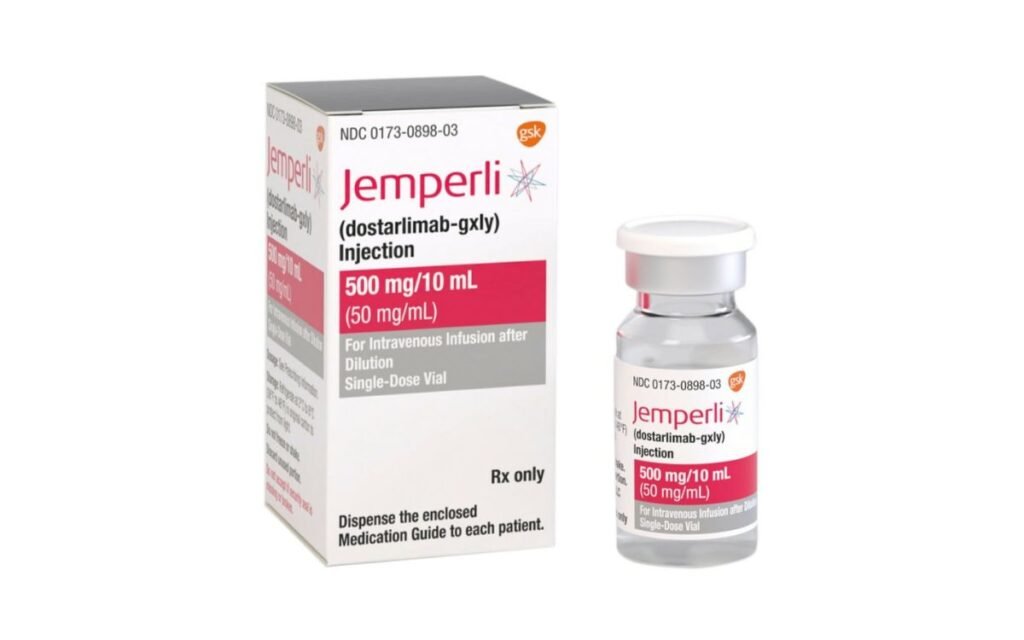GSK has achieved a significant milestone with its PD-1 inhibitor, Jemperli, in the treatment of endometrial cancer, potentially opening the door to a wider patient population. The phase 3 RUBY trial has demonstrated that combining Jemperli with chemotherapy significantly prolongs the survival of patients with primary advanced or first recurrent endometrial cancer.
GSK’s Head of Oncology Clinical Development, Hesham Abdullah, emphasized that Jemperli’s impact on overall survival is both “statistically significant and clinically meaningful.” This achievement represents a groundbreaking development as it marks the first time a PD-1/L1 inhibitor has shown an overall survival benefit in first-line endometrial cancer, one of the co-primary endpoints of the RUBY trial.
Also Read: ESMO 2023: GSK’s Jemperli Beats Merck’s Keytruda In Lung Cancer Survival Trial
Previously, an interim analysis revealed that the combination of Jemperli and chemotherapy reduced the risk of tumor progression or death compared to chemotherapy alone, although the improvement in overall survival had not reached statistical significance at that stage. However, in July, GSK secured FDA approval for Jemperli’s use alongside chemo in a subgroup of endometrial cancer patients characterized by mismatch repair deficiency (dMMR) or microsatellite instability-high (MSI-H). This approval was granted in a strategic move to address the indication where Jemperli demonstrated the strongest treatment effect, thus enabling an accelerated submission.
Now, with the trial achieving its overall survival goal across the entire patient population, GSK is optimistic about the clinical significance of Jemperli in both dMMR/MSI-H and MMR-proficient (pMMR)/microsatellite-stable subgroups. The data related to overall survival in the pMMR population is especially crucial, as it could potentially pave the way for broader first-line endometrial cancer approval. During the previous interim analysis, Jemperli showcased a promising 27% reduction in the risk of death among pMMR patients.
While Abdullah refrained from providing specific details on the new OS data, he expressed GSK’s enthusiasm for the results and confirmed their intention to present the full findings at an upcoming medical meeting and share them with the FDA.
Also Read: Endometrial Cancer Patients Get New Option With Jemperli
Notably, the RUBY trial includes multiple experimental arms, one of which involves adding the PARP inhibitor Zejula to Jemperli during the maintenance phase of treatment, with results anticipated in the first half of 2024.
GSK is preparing to face competition from other PD-1/L1 developers in the same treatment landscape, particularly in the context of chemo combinations and PARP triplet regimens. Merck’s Keytruda, for instance, has demonstrated success alongside chemotherapy in first-line endometrial cancer. AstraZeneca has also unveiled detailed results for its PD-L1 inhibitor Imfinzi and chemotherapy, with or without the PARP inhibitor Lynparza. In this trial, Lynparza appeared most beneficial in the pMMR population.
According to GSK’s estimates, approximately 14,300 patients in the United States and 9,100 individuals in the largest European countries will receive a diagnosis of first-line advanced or recurrent endometrial cancer in 2023, rendering them eligible for systemic treatments. Additionally, it is estimated that around two-thirds of endometrial cancer cases exhibit proficient DNA mismatch repair (pMMR).





























